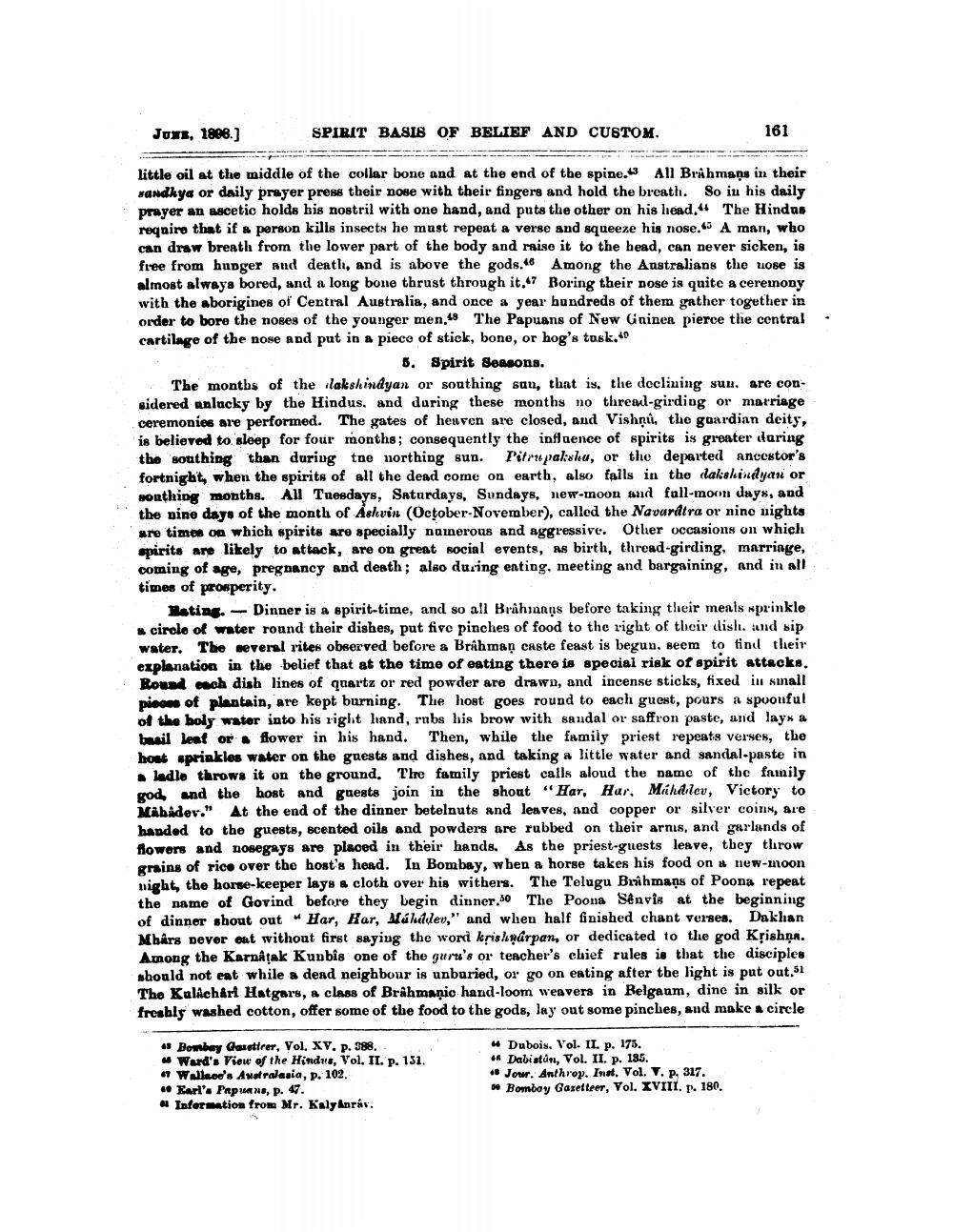________________
Jun, 1806.)
sюм. SPIRIT BASIS OF BELIEF AND CUSTOM.
161
.
little oil at the middle of the collar bone and at the end of the spine. All Brahmans in their wandkya or daily prayer press their nose with their fingers and hold the breath. So iu his daily prayer an ascetic holds his nostril with one hand, and puts the other on his head. The Hindus require that if a person kills insects he must repeat a verse and squeeze his nose. A man, who can draw breath from the lower part of the body and raise it to the head, can never sicken, is free from hunger and deatlı, and is above the gods. Among the Australians the use is almost always bored, and a long bone thrust through it." Boring their pose is quite a ceremony with the aborigines of Central Australia, and once a year hundreds of them gather together in order to bore the noses of the younger men. The Papuans of New Guinea pierce the central cartilage of the nose and put in a piece of stick, bone, or hog's tosk.
5. Spirit Seasons. The months of the lakshindyan or southing sau, thnt is, the declining sun, are con sidered anlacky by the Hindus, and during these months no threaul-girding or marriage ceremonies are performed. The gates of heaven are closed, and Vishnu, the guardian deity, is believed to sleep for four months; consequently the influence of spirits is greater during the southing than during tne northing sun. Pitrupakshu, or the departed ancestor's fortnight, when the spirits of all the dead come on earth, also fails in the dakshindyani or Northing months. All Tuesdays, Saturdays, Sundays, new-inoon and fall-moon days, and the nine days of the month of Aslvin (October-November), called the Navaratra or nine nights are times on which spirits are specially namerons and aggressive. Other occasions on which spirits are likely to attack, are on great social events, as birth, thread-girding, marriage, coming of age, pregnancy and death; also during enting, meeting and bargaining, and in all times of prosperity.
Hating. - Dinner is a spirit-time, and so all BråhranŅs before taking their meals #prinkle cirolo of water round their dishes, put five pinches of food to the right of their clish, and sip water. The several rites observed before a Brahman caste feast is begun, seem to find their explanation in the belief that at the time of eating there is special risk of spirit attacks. Round each dish lines of quartz or red powder are drawn, and incense sticks, fixed in small picon of plantain, are kept burning. The host goes round to each guest, pours a spoonful of the holy water into his right land, rubs his brow with saudal or saffron paste, and lays a buail leat or .flower in his hand. Then, while the family priest repeats verses, the hout sprinkles water on the guests and dishes, and taking a little water and sandal-paste in
ladle throws it on the ground. The family priest calls aloud the name of the family god, and the host and guests join in the shout "Har, Har, Mihdilev, Victory to Mahadev." At the end of the dinner betelnuts and leaves, and copper or silver coins, are handed to the guests, scented oils and powders are rubbed on their arnis, and garlands of flowers and nosegays are placed in their hands. As the priest-guests leave, they throw grains of rice over the host's head. In Bombay, when a horse takes his food on # new-moon night, the horse-keeper lays a cloth over his withers. The Telugu Brihmaņs of Poona repeat the name of Govind before they begin dinner.50 The Poona Senvis at the beginning of dinner shout out Har, Bar, Málddev," and when half finished chant verses. Dakhan Mbárs never eat without first saying the word kris!ınärpan, or dedicated to the god Krishna. Among the Karnatak Kunbis one of the guri's or teacher's chief rules is that the disciples should not eat while a dead neighbour is unburied, or go on eating after the light is put out.51 The Kulichårt Hatgars, a class of Brahmanic hand-loom weavers in Belgaum, dine in silk or freshly washed cotton, offer some of the food to the gods, lay out some pinches, and make a circle
• Bombay Gouettrer, Vol. XV. p. 388. · Ward's View of the Hindus, Vol. IL. P. 131. 1 Wallaod's Anatralasia, p. 102.
Earl'. Papuans, . 47. « Information from Mr. Kalyknrás.
Dubois, Vol. II. p. 175. +6 Dabiatür, Vol. II. p. 185. - Jour. Anthrop. Inst. Vol. V. p. 317.
Bomboy Gasetteer, Vol. XVIII. r. 180.




